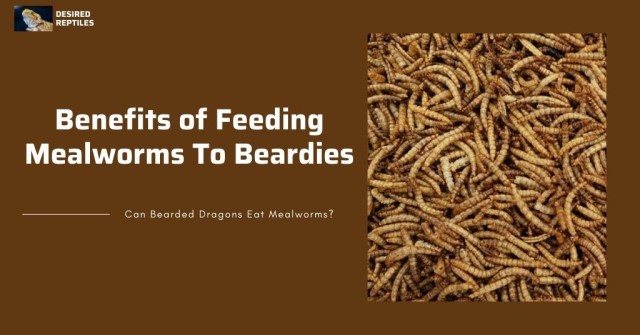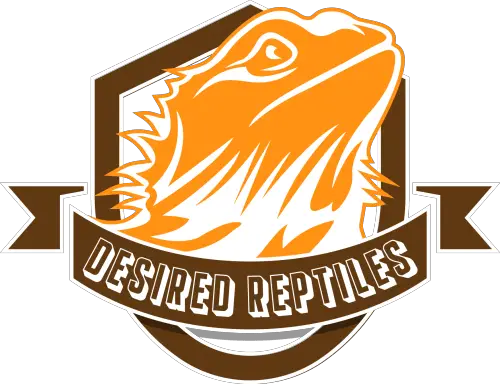Mealworms are the larvae of darkling beetles, and are commonly used in salads and as ingredients for protein bars. Most importantly, they are recommended as feeder insects for small captive reptiles that require high levels of protein to stay healthy, just like your bearded dragon! However, there’s a ruckus on whether mealworms are truthfully good, or rather, safe for beardies to eat, and we’ll be discussing all of that in a jiffy!
Bearded dragons can eat mealworms and they’re good for them in moderate amounts. They provide a healthy amount of protein, minerals, and vitamins that are needed collectively to improve and complement your beardie’s vitality. Mealworms also make a good part of the staple diet for bearded dragons in captivity.
Figuring out whether a coined “staple dietary item” is safe for your pet is an honorary thing to do. It’s important to be fully aware of what your bearded dragon can eat and how to feed it for its safety.
Are Mealworms Dangerous For Bearded Dragons? The Surprising Answer
Mealworms are nutritious for bearded dragons and there’s no argument around that fact. However, not all nutrient-dense bugs are great for them. Some are simply difficult to digest or may contain way too many goodies – fat or protein – than your beardie truly needs.
The problem with mealworms is that they’re tedious to digest, more so by younger beardies than adults because hatchlings require a faster digestive process to stay healthy. Since mealworms have a tough exoskeleton that takes time to digest and get excreted, it could lead to impaction and other complications for your bearded dragon.
In a handful of cases, some bearded dragons have died from impaction by eating too many mealworms, particularly the baby and juvenile beardies. The only way to go around this is by feeding your pet mealworms moderately and in appropriate sizes.
While it may be extreme to completely rule out feeding mealworms to beardies, there is still the possibility of injuries from impaction and even death. Nevertheless, as long as the mealworms are fed sparingly, the chances of your dragon meeting problems along the way are relatively low. It’s safe to say that mealworms are 30% dangerous for bearded dragons, and 70% safe.
5 Tips For Safely Feeding Mealworms To Your Bearded Dragon
The best way to feed mealworms to bearded dragons is once or twice a week as a varied diet. This means that you must never feed mealworms alone as the meal of the day. Your beardie should have a few crickets or roaches and its required vegetables in addition to the mealworms to aid digestion and provide your pet with a complete value of nutrients.
Before we get into it, you must know the percentage and balance of protein and vegetables your beardie requires depending on its age. The table below will help you figure that out.
| Age (months) | Percentage |
|---|---|
| 0 – 2 (Baby stage) | 30% greens, 70% grubs |
| 3 – 6 (Juvenile stage) | 30% greens, 70% grubs |
| 6 – 9 (Subadult stage) | 40% greens, 60% grubs |
| 9 – 18+ (Adult stage) | 70% greens, 30% grubs |
How To Safely Feed Mealworms To Your Bearded Dragon
- Put the mealworms in a small cup so that your pet can pick the worms up easily. Mealworms are fond of smuggling away and are too flat for bearded dragons to pick them up from the floor as they move.
- Ensure that you feed your pet at most 8 mealworms at a time. Some pet owners may prefer to feed their beardies an unlimited amount of mealworms in a specific period, but this is highly dangerous as the possibility of impaction, in this case, is high and often observed.
- The mealworms should be a complement to the meal of the day. Your beardie should also eat healthy vegetables and other protein sources dusted with calcium supplements so that the possibility of impaction is low.
- Take note of the size. Do not feed your pet mealworms that are way bigger than the space between its eyes. The size of the insect matters tremendously; if your beardie fills itself with oversized feeder grubs, it could stretch out its belly and cause temporary paralysis of the hind legs. It’s also very uncomfortable and painful for the beardie suffering from it.
- Never feed mealworms to your bearded dragon daily. Too much rigorous digestion can cause your pet to develop stomach problems, loss of appetite, and lethargy. You must only feed mealworms not more than twice a week.

4 Reasons Why Mealworms Are Good For Bearded Dragons
Mealworms are great grubs for beardies if fed correctly and they contain several benefits your pet can enjoy in the long run. Here are the reasons why mealworms are good for beardies:
1. Mealworms Are Nutritious
Mealworms contain valuable nutrients that your pet needs to stay healthy like vitamins B12, calcium, protein, and fiber. These nutrients are responsible for maintaining the body mass of your pet including the circulatory and nervous systems.
2. Great For The Teeth
Soft worms like butter worms and hornworms can cause plaque buildup in your beardies teeth that the tough shell of mealworms can help to break down. Your pet’s teeth must stay free of plaque to prevent periodontal diseases from developing.
3. Mealworms Are Great Gut-Loading Material
It’s necessary to gut-load your feeder worms to improve their nutritional value before offering them to your pet. When your beardie is fed nutritious foods often, they will be at less risk of getting sick and be much more equipped to fight off diseases. They’d also age well and live longer in comparison to pets who are fed the opposite. A healthy bearded dragon is a happy one!
4. Mealworms Are Readily Available
The cost of buying mealworms is relatively low, thus making them readily available for beardies. They can also be stored easily and bred to multiply and serve you and your dragon better.
How To Breed Mealworms For Bearded Dragons – Step-By-Step For Beginners
If you’re interested in having a home service of mealworms for your pet, here’s how to breed them:
- Purchase the starter worms. You can get mealworms from exotic pet stores or online retailers. Just make sure they’re trustworthy; read the reviews or get a referral from a bearded dragon breeder.
- Get a clean and sanitized container with a lid. The container has to be free of bacteria so that the worms don’t get infected and die off from this.
- Pour in a substrate for the mealworms. Oats and cornmeal are great substrates for mealworms. They’re nutritious and easy to burrow.
- Put in the mealworms. Place the mealworms into the container with the substrate and close it with the lid. Ensure that there are holes bored into the container for ventilation.
- Add in food and water. Mealworms can eat a plethora of fresh foods. Throw in large chunks or slices of carrots or sweet potatoes to provide them with moisture and extra vitamins. You must replace the potato and carrot chunks when they dry out which usually takes 4 days.
- Harvest the worms. The mealworms take at most 4 weeks to grow into adult beetles. In 8 weeks, the adult beetles will start a new generational colony laying hundreds of eggs that hatch into the larva (mealworms). You can then harvest and feed them to your beardie. Ensure you take note of this and harvest them on time before they become pupas again!
The Hazards Of Feeding Too Many Mealworms To Your Beardie
There are consequences of feeding too many mealworms to your pet. It’s important for your pet to eat the worms moderately to prevent it from falling sick. Here are the dangers excessive mealworms pose to your bearded dragon:
Impaction
Impaction is fatal to beardies depending on the severity. It can quickly deplete the health of your pet and can lead to internal injuries. Feeding mealworms to your bearded dragon in excess can and will cause it to be impacted. In several cases, the mealworm-impacted beardies die from this mistake. It’s highly crucial to feed mealworms to your dragon moderately.
Obesity
Feeding your dragon too many mealworms can cause it to be obese over time. The high levels of protein are relatively unsafe to be consumed frequently by your pet. However, very unfortunately, the bearded dragons that eat mealworms as a staple diet over time die from impaction before they are given the chance to be obese.
Wrapping It Up
Bearded dragons enjoy mealworms and they benefit from the nutritional value the worms provide. As a good source of protein, your pet is halfway through attaining its nutritional value for the day. Ensure that you refer to your veterinary doctor if you experience any change in behavior after your beardie eats the worms. Remember, too much of it is an easy ticket to impaction. However, as long as you feed your pet the mealworms correctly, you and your beardie will enjoy the ordeal. Happy munching and good luck!
